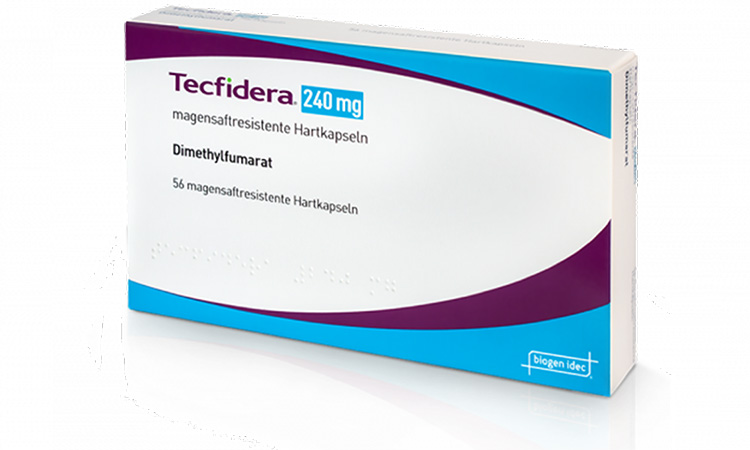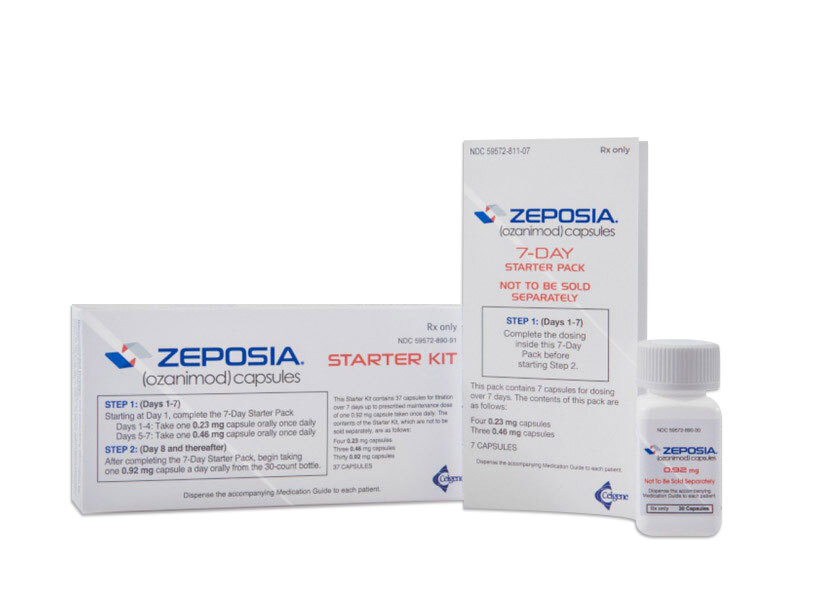Tecfidera (dimethyl fumarate) vs Zeposia (ozanimod)
Tecfidera (dimethyl fumarate) vs Zeposia (ozanimod)
Tecfidera (dimethyl fumarate) is an oral medication for multiple sclerosis that works by activating the Nrf2 pathway, which may help protect against oxidative stress and inflammation in the central nervous system. Zeposia (ozanimod) is another oral option that functions as a sphingosine 1-phosphate receptor modulator, trapping certain white blood cells in lymph nodes, which may reduce their ability to cause central nervous system damage. When deciding between the two, patients should consider differences in their mechanisms of action, side effect profiles, and any pre-existing health conditions they may have, as well as consult with their healthcare provider to determine the most appropriate treatment for their specific case of multiple sclerosis.
Difference between Tecfidera and Zeposia
| Metric | Tecfidera (dimethyl fumarate) | Zeposia (ozanimod) |
|---|---|---|
| Generic name | Dimethyl fumarate | Ozanimod |
| Indications | Relapsing forms of multiple sclerosis (MS), including clinically isolated syndrome, relapsing-remitting disease, and active secondary progressive disease | Relapsing forms of multiple sclerosis (MS), including clinically isolated syndrome, relapsing-remitting disease, and active secondary progressive disease; Ulcerative colitis |
| Mechanism of action | Activates the nuclear factor (erythroid-derived 2)-like 2 (Nrf2) pathway, which is involved in the cellular response to oxidative stress | Sphingosine 1-phosphate receptor modulator, which traps lymphocytes in lymph nodes, reducing the number of lymphocytes in peripheral blood |
| Brand names | Tecfidera | Zeposia |
| Administrative route | Oral | Oral |
| Side effects | Flushing, abdominal pain, diarrhea, nausea | Upper respiratory infection, elevated liver enzymes, orthostatic hypotension, hypertension, urinary tract infection |
| Contraindications | Known hypersensitivity to dimethyl fumarate or any of the excipients in the formulation | Patients who in the last 6 months have had a myocardial infarction, unstable angina, stroke, transient ischemic attack, decompensated heart failure requiring hospitalization, or Class III/IV heart failure; Patients with a history of hypersensitivity to ozanimod or any of the excipients in the formulation |
| Drug class | Fumaric acid ester | Sphingosine 1-phosphate receptor modulator |
| Manufacturer | Biogen | Bristol Myers Squibb |
Efficacy
Tecfidera (Dimethyl Fumarate) Efficacy in Multiple Sclerosis
Tecfidera (dimethyl fumarate) is an oral medication approved by the U.S. Food and Drug Administration (FDA) for the treatment of relapsing forms of multiple sclerosis (MS), including clinically isolated syndrome, relapsing-remitting disease, and active secondary progressive disease. The efficacy of Tecfidera in MS has been demonstrated in several clinical trials. These studies have shown that Tecfidera can reduce the rate of relapses, slow the progression of disability, and decrease the number of new or enlarging brain lesions as seen on MRI scans. Specifically, the DEFINE and CONFIRM phase 3 clinical trials reported significant reductions in annualized relapse rates and improvements in other measures of disease activity compared to placebo.
Zeposia (Ozanimod) Efficacy in Multiple Sclerosis
Zeposia (ozanimod) is another oral medication that has been approved by the FDA for the treatment of relapsing forms of multiple sclerosis, including clinically isolated syndrome, relapsing-remitting MS, and active secondary progressive disease. The efficacy of Zeposia in managing MS was evaluated in the SUNBEAM and RADIANCE part B clinical trials. These studies showed that Zeposia significantly reduced the annualized relapse rate compared to interferon beta-1a, a commonly used MS medication. Additionally, Zeposia was associated with a reduction in the number of new or enlarging brain lesions on MRI and slowed the progression of disability.
Comparative Efficacy of Tecfidera and Zeposia
When comparing the efficacy of Tecfidera and Zeposia, it is important to consider that direct head-to-head trials have not been conducted. However, both medications have demonstrated effectiveness in reducing relapse rates and managing disease progression in their respective clinical trials. The choice between Tecfidera and Zeposia may depend on individual patient factors, including side effect profiles, dosing convenience, and specific patient health considerations. Healthcare providers take these factors into account when recommending a treatment plan for MS patients.
Conclusion
Both Tecfidera and Zeposia have shown to be effective in the treatment of relapsing forms of multiple sclerosis, which is a chronic, often disabling disease that attacks the central nervous system. While both drugs work through different mechanisms of action, their efficacy in reducing relapse rates and slowing disease progression provides valuable options for patients and clinicians managing this complex condition. Continued research and long-term data will further elucidate the impact of these medications on the MS disease course and patient quality of life.
Regulatory Agency Approvals
Tecfidera
-
European Medical Agency (EMA), European Union

-
Food and Drug Administration (FDA), USA

-
Health Canada

-
Therapeutic Goods Administration (TGA), Australia

-
Medsafe (NZ)

Zeposia
-
European Medical Agency (EMA), European Union

-
Food and Drug Administration (FDA), USA

-
Health Canada

-
Therapeutic Goods Administration (TGA), Australia

Access Tecfidera or Zeposia today
If Tecfidera or Zeposia are not approved or available in your country (e.g. due to supply issues), you can access them via Everyone.org.
How it works

Make an enquiry
Choose the medicine you want to buy, answer a couple of questions, and upload your prescription to speed things up. We’ll get back to you within 24 hours.


Make an enquiry
Choose the medicine you want to buy, answer a couple of questions, and upload your prescription to speed things up. We’ll get back to you within 24 hours.


Breeze through the paperwork
We'll guide you through the required documents for importing unapproved medicine, ensuring you have all the necessary information.


Get a personalized quote
We’ll prepare a quote for you, including medicine costs and any shipping, administrative, or import fees that may apply.


Receive your medicine
Accept the quote and we’ll handle the rest - sourcing and safely delivering your medicine.

Some text on this page has been automatically generated. Speak to your physician before you start a new treatment or medication.
Let's talk
If you have any questions, call us or send us a message through WhatsApp or email:
Contact us




